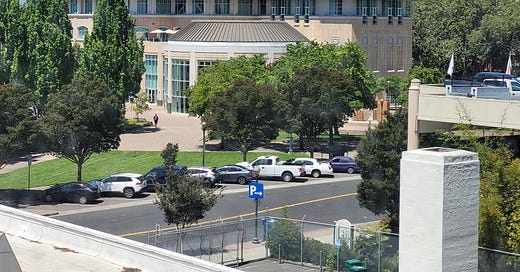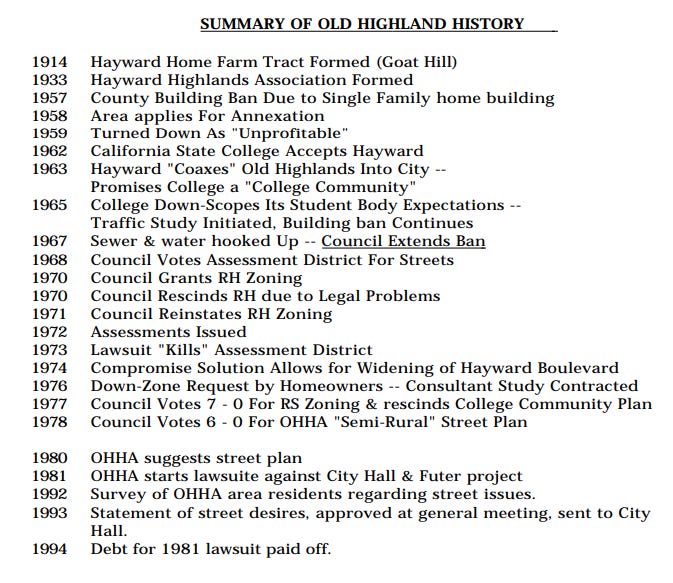Hayward Collects Its Debts
In Which: Old Highland history is explained; The City prepares to collect on unpaid bills; and Lobbying definitely pays off for the City.
Speculation Station: Statutory Limitation?
Aside from the ongoing contract negotiations with the three City Staff bargaining units (Hayward Association of Management Employees, International Federation of Professional and Technical Engineers Local 21, and Service Employees International Union 1021—representing both Clerical Staff and Maintenance Staff), there are two different lawsuits that are coming up in Closed Session to Council tonight.
Roe v. Montenegro, et al. According to a summary this lawsuit appears to have something to do with AB 218, which is confusing because there are two different AB 218’s. The most recent one, which went into effect in 2023, allows people to change their gender and/or sex identifier on a bunch of different legal documents. The other was passed in 2019 and extends the statute of limitations on childhood sexual abuse. Which is it? I have no idea!
Benson v. City of Hayward, et al. I have no idea what this one is about. It’s like pulling teeth trying to get any meaningful information from a U.S. District Court. All I can find is a docket report which gives no really meaningful information and I’m not signing up for another account for PACER. I really just can’t.
This brings me to a small gripe, if you’ll please bear with me. I know legal information is complicated, niche, and that lawyers and law firms have cash to splash. I also know that, for whatever reason, our court system is required to fund itself, at least in part, with fees and fines.
But extending these fees to basic legal information about the lawsuits my tax dollars are paying for is inane. I shouldn’t have to do a captcha 32 times to look up the case number in the Alameda County Courts. I nobody should have to pay to look cases up by name. Nobody should have to sign up for another account just to access publicly available information that is near-impossible for the layperson to parse anyway.
This is another barrier to government transparency that keeps people like you and me from accessing information we should have. Also, I think we can all agree: Captchas are the worst.
You’ll Pay What You Owe
A huge portion of the consent items this week are to approve the collection of assessments. If you have an HOA, you likely live in constant fear of a Special Assessment—a fee the HOA can suddenly impose on everyone to cover costs in lieu of raising monthly fees. There are a lot of different reasons the City can collect Assessments and this is the time of year to get them approved.
The End Of A 50-Year Saga
The regularly scheduled one covers the Old Highland Neighborhood and the conclusion of their 60 year battle with the City. When the Old Highland Neighborhood incorporated into the City of Hayward back in 1963—maybe even earlier—the City required them to bring their roads up to the City’s standards. If you’ve ever been in that neighborhood, you’ll be unsurprised to hear that they said “No.”
Thus began decades of battles between the Old Highland Homeowners Association and the City of Hayward. I mean, look at this timeline:
This is from a 14-page history of the OHHA—which is a wild read, to say the least—and doesn’t even culminate in this recent final assessment district that they’ve been arguing about since 1973! The cost to the residents of this district for 6 miles of road: $182,000 for the whole neighborhood to refurbish roads that haven’t been maintained since at least 1963.
Call A Collections Agent
The rest of the assessments are less about affluent people fighting over streets and more about people not paying their bills. There are a few different things that people don’t pay for when they’re supposed to and it adds up to a tidy sum.
The Community Preservation and Rental Program has unpaid fees of over $602,000, the Housing Relocation Assistance Program—which forces landlords to pay for a tenants relocation if they decide to sell or redevelop the property—thankfully only has 1 landlord that owes around $8,300.
Unpaid Sewer and Water Bills are owed by 96 properties to the tune of around $103,000. And finally unpaid Garbage bills are owed by 1,649 properties to the tune of around $995,000. It’s important to note that these are owed by property owners—tenants are not directly on the hook for these last two.
For most of these unpaid bills, the City is still going to send notices and let them know that if they don’t pay, they’ll have a Special Assessment put on their Property Tax bills. But Staff said that usually about half of the people pay up when they get the notices, which is a nice grace for folks who had hardships or just plain forgot. Everyone else will have to start dealing with the County.
Feds Fund Promise Neighborhood and Library
It’s a bit unclear from the Staff Report, but some grant funds are coming to the South Hayward Promise Neighborhood—about $100,000—so that they can keep providing essential services to the South Hayward area. Hayward is fortunate enough to have three Promise Neighborhoods now, and although the Downtown Promise Neighborhood is the primary focus now, South Hayward still needs help. This money will make sure they get it.
The Weeke’s Branch of the Library will also be getting $100,000 from the grant—at least it seems that way—and they’ll use it to buy new furniture and renovate their meeting spaces. So although a full renovation is a ways off—until Measure C is extended—it’s good to know that Weeke’s is doing more than just putting up literal fences against the unhoused.
Lobbying Contract Renewed
Okay, according to the Staff Report they’re “advocacy” groups, but the fact is that the City pays people to go to Sacramento and DC to try to funnel money their direction. I’m sure all Cities do it to some extent, and Hayward’s advocates are getting their contracts renewed.
On the State side, Townsend Public Affairs—which brands itself as a lobbying firm—will be getting $72,000 this next year for their contract. The City has been with them since 2009 and their investment has, according to the Staff Report, really paid off: $12,700,000 in State funds are being credited to them. This includes funds for HEART, the Stack Center, and a St. Rose Subacute Facility.
On the Federal side, there’s Capitol Advocacy Partners—started by a former member of Townsend—which the City has been with since 2014. Their contract will be a mere $70,000 for this year and they’re being credited with securing over $22,000,000. Interestingly, over half of that money—$13,500,000—has been for “public safety”: $9,970,000 for Hayward PD, $3,100,000 for the Youth and Family Services Bureau (also HPD), and a mere $1,400,000 for the Fire Department. They also secured $1,930,000 for the St. Regis project.
Clearly these investments in lobbying are paying off. And if Cities are doing this for the equivalent of $33/hour, imagine how much big corporations are getting with their deep pocketbooks.
Speaking Of Which…
The HEART program is getting $1,200,000 from the California Department of Health Care Services to fund their operations into 2026, it seems. This appears to be the above-mentioned work that Townsend Public Affairs is doing to secure funding for the City. They worked with the Office of State Senator Aisha Wahab, former City Councilmember of Hayward, to secure the funding from the state.
YFSB Gets Another Contract
The Alameda County Probation Department, which supervises formerly incarcerated individuals like in the movies, has given the HPD Youth and Family Services Bureau (YFSB) a grant of $1,242,000 over two years. It does seem strange that the Probation Department is so involved with youth, but their website highlights that they “supervise” 441 children with 90 more that are currently incarcerated (not to mention the over 5,000 adults).
This money is undeniably necessary. We need trauma-informed care, mental health counseling, guidance to community resources, and diversion services. The question is why is it still going to HPD? Although there are undoubtedly efficiencies to having these all under one roof, the regularly-cited fact that no other agency should prompt us to question why we do it this way.
I’m fine taking cop money to provide mental healthcare, but why do 13 Social Workers and Marriage and Family Therapists live in the Police Department? We could fund a community group, use different methods that have a proven track record of diversion and intervention, or just do the same thing without having the PD involved. We can think differently and possibly avoid the hundreds of calls that schools make to HPD every year—often times for student conduct—even Elementary schools.
It all starts with asking why we do it this way.






